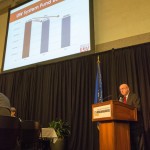
President Cross
MILWAUKEE – The University of Wisconsin System Board of Regents today unanimously approved a $6.097 billion spending plan for the state’s public university system, using $159.9 million in accumulated balances to freeze tuition rates at current levels and to support other student-related academic and program needs.
The Board’s action funds the UW System for the fiscal year that begins on July 1, 2014, and ends on June 30, 2015. The FY15 budget is an increase of approximately 1.7% in total expenditures, primarily the result of the state-approved 1% pay increase plan as well as debt service and projected increases in the UW System’s costs for utilities, goods, and services.
- See the
- See
- See President Cross’ remarks
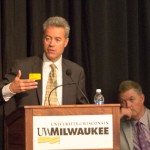
Interim Chancellor Mone
In presenting the spending plan to the Board, UW System President Ray Cross said that it provides more details on types and categories of expenditures than was ever provided to Regents in previous annual plans. Cross said it was part of a comprehensive reform of the university’s financial management and reporting practices.
“Perhaps the most noteworthy reform we are making within the financial management systems is the disaggregation of our finances,” Cross explained. “In this proposed annual budget you will see the budget broken down by fund and by institution. Before the October Board meeting, you will also see each institution’s fund balances broken down by category.”
“These reforms are consistent with the Board’s charge to Ray and his administration,” said Regent President Michael J. Falbo. “As the university system’s governing body, we must have access to the best information possible in order to provide appropriate levels of oversight. The changes presented to us today will improve our ability to meet our statutory obligation to assess the present and plan for the future.”
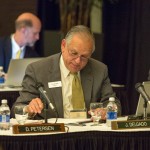
Regent Delgado (center)
Cross added that as part of the reforms, the System and its member institutions will be required to conform to terminology and standards used by the Legislative Audit Bureau. Doing so will provide greater clarity and accountability regarding the university’s finances, he said.
Cross also reported that the institutional and System-wide fund balances accumulated over time have been reduced from $1.097 billion on July 1 to a projected $917 million at the end of this month in order to support ongoing and one-time needs.
“This represents a 16.5% reduction during the last year,” he explained. “Those balances are projected to further drop to approximately $800 million by June of next year. In total, this represents a 27% drop over a two-year period.”
Cross also pointed out that two categories of spending have seen significant reductions through planned and designated uses.
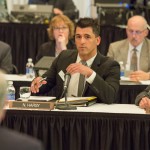
Regent Nicolas Harsy (center)
“It is important to note that the tuition fund balance is projected to drop significantly—from $551 million last June to $304 million by June of next year. That represents a 45% reduction in the two-year period.” Those funds are being used to keep tuition rates at existing levels, he explained.
“I am also pleased to note that [the centrally held] systemwide tuition fund is projected to be down from $151 million in June of last year to about $60 million this June,” Cross continued. “I promised the Board, the Governor, the Legislature, and the chancellors it would be cut in half by this June.”
“This is fundamentally a more transparent budget process than we’ve seen previously. The transformation from this last year to this year has to be acknowledged,” said Regent Jan Mueller.
“The format of this budget, looking at our financials not only as they exist now but also to look into the future, that’s a tool we haven’t had before,” said Regent Vice President Regina Millner.
“This is a giant step as far as I’m concerned,” Falbo said.
- See the news release about ‘four pillars’ of biennial budget plan
- See the news release about UW Regents approving spending plan for FY 2015
Board looks ahead to biennial budget discussion
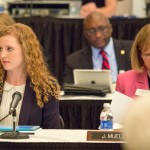
Regent Anicka Purath (left)
Maximizing affordability and containing student debt are UW System’s top priorities, said Cross, as he offered a preview of the university’s 2015-17 biennial budget plan. He added that affordability is one of four “pillars” of the two-year budget plan he will present to the Board at its Aug. 21-22 meeting.
“We want to be aggressive in our efforts here, and we have several actions that will help make that possible,” Cross said.
One of the actions Cross outlined is a new student financial aid incentive, eliminating the waiting list for UW students eligible for Wisconsin Higher Education Grants (WHEG). Under the proposal, the UW System would work with the Higher Education Aids Board to ensure that all eligible UW students receive a WHEG grant.
Last year, 3,581 UW students eligible for a WHEG grant were put on a wait-list and ultimately turned away because the program lacked enough funds to provide for all who qualified.
“We must remedy that,” Cross said. The UW System will request $14.9 million over the new biennium to eliminate wait-listing, he added, noting that that funding level will allow the average grant amount to be increased in the second year of the biennium. The Board approved this recommendation.
Other actions intended to help students afford and complete a UW degree include:
- A tuition freeze at all UW institutions for the 2014-15 academic year,
- A new 30-credit transfer agreement between UW and the Wisconsin Technical College System, and
- Dual- and concurrent-enrollment UW courses offered in public high schools as part of Wisconsin’s new Course Options program.
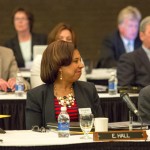
Regent Eve Hall (center)
Along with affordability, Cross said another key pillar of his biennial budget plan involves major reform of financial management and planning procedures, which he described as “perhaps the most significant internal organizational changes since the creation of the UW System” 43 years ago.
“We are developing new tools and new ways to analyze and manage our finances,” he explained. He said he will be designating a project manager and a review panel to ensure compatibility with Legislative Audit Bureau standards for fund balances and to promote financial transparency.
Cross’ other two pillars are interrelated to the university’s successful pursuit of the Wisconsin Idea. “We will more deeply engage the university in the challenges facing our state,” he explained. “We cannot address all of the state’s challenges but we can focus on a few. “
Finally, in order to successfully tackle those and other public challenges, Cross said the UW System must be able to recruit and maintain high-quality faculty and staff.
“We are committing ourselves to developing effective, sustainable compensation solutions so that the UW System can compete in the global higher education marketplace,” he said.
UW Regents will review and act on specific details of the biennial budget plan in August. Following Board approval, the plan will be forwarded to Gov. Scott Walker for consideration as part of his comprehensive two-year state budget.
UW-Milwaukee is ‘moving forward together’
In a presentation before the full Board, UWM’s Interim Chancellor Mark Mone told Regents that UWM is “an institution at the crossroads.”
In his presentation, “Moving Forward Together: Strategic Directions for UWM,” Mone pointed out that UWM is relied upon for providing a skilled workforce for area industry. “Over 90% of UWM graduates stay in Wisconsin,” he said. “There’s simply no other large institution that can say that.”
On the flip side, he noted that the university has reached the tipping point in terms of resources.
“We are lean and underfunded and need to attract reinvestment. If we don’t, it will be very difficult for us to deliver on our promises,” Mone said.
He cited a study done in 2012 that identified talent retention as the No. 1 risk to the university’s effectiveness. Compensation, Mone said, “has to be a part of the conversation” between UWM and the state.
A shrinking number of people of working age and a growing number of workers who are retiring leaves area employers facing a workforce gap, said Tim Sheehy, president of the Metropolitan Milwaukee Association of Commerce. Without UWM graduates in key areas, he said, area jobs of the future will “go someplace else.”
UWM needs to act now in order to improve its six-year student retention rate from 43 to 50% that will serve industry needs, Mone said. UWM is being proactive with student enrollment management, strategic planning and has a strong start in a major fund-raising campaign.
Mone urged the Regents stand by UWM. “A higher research profile is entirely compatible with the types of activities we are already engaged in,” he said. “UWM has not yet begun to have the impact on Southeast Wisconsin that we can have,” said Mone.
In other host-campus presentations, Mone updated members of the Research, Economic Development, and Innovation Committee on three projects led by UWM that are supported by the one-time UW System Economic Development Incentive Grants.
Funding for 11 UWM-industry collaborative research projects were made through the Incentive Grant that establishes a Southeast Wisconsin Applied Chemistry Center of Excellence. Similarly, UWM seeded nine partnered research projects through its Water Technology Accelerator that involve development of water-related products.
Robin Van Harpen, UWM’s vice chancellor for finance and administrative affairs, told members of the Capital Planning and Budget Committee that the university will be a wise steward of resources allocated for capital building projects now under way and planned on campus.
“We are grateful for the continuing support of the Board of Regents and the UW System,” Van Harpen said. “The vast majority of UWM graduates remain in Wisconsin, many after having worked with our community partners in research and innovation. All of our capital investments will include long-term benefits and will leverage the talents of our staff and faculty.”
In the Education Committee, Interim Vice Provost for Research Mark Harris and Provost Johannes Britz presented information on the university’s strategic planning process for research. UWM’s goal is to become a top tier research university, and the two-year strategic planning process has laid the groundwork for that, said Britz.
Developing the research part of the university’s academic plan, part of its overall strategic plan, involved a 19-member team, more than 45 meetings and a great deal of discussion, information gathering and synthesizing of ideas into top priorities, according to Harris.
The plan calls for research excellence as a leading goal, coupled with student success and community engagement in an innovative environment, said Harris. The plan focuses on critical steps such as developing top tier research teams; using funds as investments rather than permanent allocations; targeting specific outcomes and then assessing results and adjusting as necessary.
Greetings and farewells
Regent President Falbo introduced the four new members of the Board of Regents. José Delgado, of Brookfield, is the former CEO of American Transmission Company. Eve Hall, of New Berlin, is president of the African American Chamber of Commerce. Nicolas Harsy, of Middleton, will serve as the non-traditional Student Regent. Harsy, who is studying mechanical engineering at UW-Madison, served in the United States Marine Corps from 2008-2013, including two tours in Afghanistan. Anicka Purath, of Mount Pleasant, will serve as a Student Regent. She is studying political science at UW-La Crosse.
The Board also recognized the service and accomplishments of Regent Emeritus Gary Roberts and Student Regent Emerita Tracy Hribar, whose terms have concluded.
Regent Roberts, who’d served since 2011, said his time on the Board had been an “overwhelming responsibility” and “an opportunity to give back.” He called on his Regent colleagues to actively support diversity of opinions. “I ask you to stand up and exchange contrary opinions,” Roberts said. “It’s not about liberals, it’s not about conservatives. We need to encourage tolerance and be accepting of all views.”
Regent Hribar, the non-traditional student representative on the Board and a recent graduate of UW-Parkside, saluted the Regents for their support of expanded educational opportunities for adult students like herself. “It’s important to keep finding innovative ways to meet the educational needs of these students,” she said. Hribar also expressed her appreciation for the UW System’s continuing efforts to provide “an affordable, accessible place for everyone to get an education.”
REDI Committee endorses undergraduate research grant programs
The Research, Economic Development and Innovation Committee endorsed two initiatives to support undergraduate research.
The Research Block Grant program is designed to foster important undergraduate research and discovery leading to innovation being generated on campus. The capacity-building block grants of up to $50,000 for four-year UW institutions and $10,000 for two-year institutions will assist in alleviating some of the existing resource limitations to expanding undergraduate research. The block grants will be awarded based on work plans and recommendations developed by each campus to serve site-specific needs.
The Regent Scholar program would provide grants to individuals or campus programs, working in conjunction with students, which undertake innovative undergraduate research projects with the potential to lead to job creation and economic development and foster entrepreneurship. The program will initially provide five awards of up to $50,000. Awardees, who will be selected by a committee of both public and private sector experts, will be recognized as “Regent Scholars.”
“Undergraduate research is a practice that meets multiple policy goals and its growth will benefit new students, academia, our research enterprise, and Wisconsin’s economy,” said Kris Andrews, associate vice president for federal and corporate relations.
Both proposals encourage participation of historically underrepresented faculty and students in undergraduate research, recognizing that this high impact practice has the capacity to close achievement gaps in student success and completion.
- See the
- See the
- See the
In other business, the Committee:
- Heard a report from Brightstar Wisconsin Foundation on the organization’s innovative approach to funding entrepreneurial activities and fostering job creation;
- Heard an update from Reed Hall, CEO of the Wisconsin Economic Development Corporation, on its partnership activities with the UW System, including the new Ideadvance initiative.
Capital Planning and Budget Committee
UW System Senior Architects Chris Gluesing and Jeff Kosloske presented information describing the process of master planning and the implementation of major building projects.
- See the PowerPoint presentation
In other business, the Committee:
- Approved UW-La Crosse’s request for authority to construct an $8.4 million ($4.3 million GFSB and $4.1 million PRSB) West Campus Chilled Water Plant Project to augment the capacity of the existing campus chilled water system;
- Approved UW-Platteville’s request for approval to accept an in-kind gift of 30 acres of land with improvements of a Swine Center Facility and a Criminal Justice House, all of which is valued at approximately $1.3 million;
- Approved UW-Stevens Point’s request for authority to amend the campus boundary and purchase two parcels of land for parking purposes;
- Approved UW System’s request for authority to construct various Classroom Renovation/Instructional Technology Improvement projects at an estimated total cost of $14.4 million; and
- Approved UW System’s request for five All Agency Maintenance and Repair projects with an estimated total cost of $5 million that include parking ramp maintenance, roof repairs, and utility improvements.
Education Committee endorses Universal Credit Transfer Agreement
A University Credit Transfer Agreement between the UW System and WTCS was endorsed by the Education Committee. The agreement, in response to and fulfilling requirements of Wisconsin Act 20, will go into effect on July 1, 2014.
The agreement identifies core general education courses totaling not fewer than 30 credits that are transferable and would satisfy general education requirements at the receiving institution or college, between and within each institution, college campus, and technical college.
“This is a large step forward,” said Regent Tony Evers, State Superintendent of Education and a member of the Education Committee. The change, he added, will give students on all campuses peace of mind that the general education course work they’re doing can be more easily transferred.
The long-standing inter-institutional collaboration and strong culture of support for transfer students with WTCS provided the foundation for the development of this agreement. This and other transfer agreements are made accessible to the public through the existing Transfer Information System (TIS) website.
The terms of the agreement will be subject to Regent review and renewal annually.
The Committee also approved minor updates to Regent Policy Document 7-1, the UW Undergraduate Transfer Policy, necessitated by the addition of the Universal Undergraduate Credit Transfer Agreement between UW System and WTCS to the other transfer procedures agreements already listed in this Regent policy.
- See the PowerPoint presentation Strategic Planning: Case Study of the Top-Tier Research University Thematic Team
In other business, the Committee:
- Approved an adjusted UW-Madison Annual Request to Trustees of the William F. Vilas Trust Estate for support of scholarships, fellowships, professorships, and special programs in arts and humanities, social sciences, biological sciences, physical sciences, and music in the amount of $7,853,718; the Vilas proffer for UW-Milwaukee (their request for $120,769 was approved at the April BOR meeting); and the Report on Promotions Tenure Designations, and Related Academic Items.
- Approved revision of the UW-Platteville mission; and
- Approved UW-La Crosse’s request for an addendum to their mission, last revised in 2010.
Business and Finance Committee approves fund balance policy changes resolution
The Business and Finance Committee approved a resolution adopting legislatively mandated changes to the fund balance policy adopted by the Board at its April 2014 meeting. Significant changes directed by the Legislature’s Joint Committee on Finance included eliminating the minimum targeted balance of 10% of total fiscal year expenditures for Tuition and Auxiliary Operations. Institutions with negative balances will be required to submit a plan for eliminating the negative balance to the Board. The 15% reporting threshold also was reduced to 12%.
In other changes, UW System Administration will be required to develop and submit an annual plan for the entire carry-forward balance held in UW systemwide accounts. The Board will be directed to report to the Joint Committee on Finance and the Joint Legislative Audit Committee on program revenue balances annually by Oct. 15.
In other business, the Committee:
- Approved a seven-year contract between UW-La Crosse and Gillette Pepsi-Cola for exclusive soft drink pouring and vending rights at the institution;
- Approved a collaborative training agreement between UW-Madison and Nestle-Shuangcheng, Ltd. to develop a curriculum and assist with training at a dairy farming institute in Shuangcheng, Heilongjiang Province, China;
- Heard a quarterly report of gift, grant, and contract awards for the period July 1, 2013 through March 31, 2014. Total awards for the period were approximately $1.1 billion, a decrease of $10.4 million compared to the prior year. Federal awards increased $6.6 million while non-federal awards decreased by $17.0 million;
Human Resources System Update: Interim Vice President for Finance Steve Wildeck updated Regents on steps that have been taken to address concerns raised by the Legislative Audit Bureau regarding a material weakness with security. Wildeck reported that UW System Administration has contracted with PwC to provide an independent external review of the audit findings to ensure that the material weakness is being addressed and will complete its work next week.
Photo credit: Troye C. Fox, UWM Photo Services
See more photos from the meeting.
The UW System Board of Regents will continue its meeting at 8:30 a.m. on Friday, June 6, 2014, at UW-Milwaukee.
Related: June 6 (day 2) news summary | Watch video webcast of June 5, 2014, meeting
